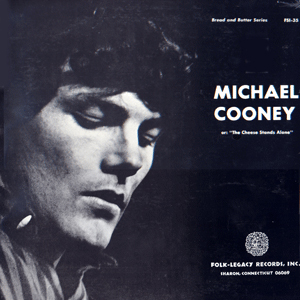Reflections on Children’s Music – Part III – Michael Cooney
10 Sunday Jun 2012
Written by Gary Storm in Uncategorized
Tags
Children's Music, children’s literature, cruelty, Huckleberry Finn, innocence, Leslie Fiedler, Michael Cooney, terror
Share it
 (I introduced the great American scholar, Leslie Fiedler, in Part I of these essays on children’s music. My comments are informed by concepts introduced in a graduate course Leslie taught on children’s literature.)
(I introduced the great American scholar, Leslie Fiedler, in Part I of these essays on children’s music. My comments are informed by concepts introduced in a graduate course Leslie taught on children’s literature.)
The boyish folk singer Michael Cooney. His persona is adolescent, and his voice is high and thin, and truth be told, if his livelihood rested exclusively on his vocal ability, I don’t think I would have heard of him. But he is a virtuoso of the six string guitar, twelve string guitar, five string banjo, fretless banjo, concertina, slide, finger picking, pickety picking, and something new with each album. And he knows at least a million songs, all kinds of traditional folk music. Michael Cooney is one of the greatest folklorists alive, though I don’t believe he ever went to college, and he doesn’t stand around smoking a pipe, cultivating a trimmed beard, and wearing corduroy jackets with patches on the elbows. The liner notes to his albums are as historically informed, musicologically analytical, imaginatively recondite, and exploding with love for the subject as anything in the Journal of American Folklore. Fact is, he is one of the greatest deepest folk singers who ever lived. And everything he ever did, whether he meant it or not – or whether the creators of the songs he sings meant it or not – was made for children.
Here is a silly song, played on the banjo, about a poor sap who is drafted and sent into war. To those unfamiliar with the childish mind, a song about the sufferings of war may not seem an appropriate subject for a children’s song.
I wish you could have been there for Leslie Fiedler’s lectures on Huckleberry Finn. He said that it is a mistake to equate childhood with innocence. Those who call childhood a time of innocence are unaware of the natural inclinations of children. Huck plays cruel tricks on Jim, and this reminds us that cruelty is a childish impulse. The cruel humor of children exposes an ambivalence we are reluctant to acknowledge. Leslie said this irony, the selfishness and brutality in the children we idealize as adorable and gentle, is a deception all humans blithely adopt. There was never a world of innocence. Even metaphorically, ascribing innocence to childhood does not make sense. The childhood of humanity was rooted in brute survival. The childhood of technology was rooted in war. The childhood of America was rooted in slavery.
There is hardly a book with more terror and wickedness and cruelty than Huckleberry Finn. The hero is a young teenage boy who smokes, plays hooky, lies continuously; he decides on his own that what preachers, teachers, and legislators have told him is wrong; he runs away from family, civilization, and the church; he has an ambivalent racist-love relationship with Jim – he follows the impulses of his own foolish heart. The thing is, kids really respond to all this wildness. And, by any standard, Huckleberry Finn is one of the greatest works of children’s literature. Leslie said, if you do not like Huckleberry Finn, you were born old.
And so it is with this song. If you can’t find the virtue of childish laughter in this song about a very serious problem, you were born old. After all, ain’t the neglect of laughter part of the problem?
The Captain said to fire at will
And I said, “Which is he?’
The old fool got so ragin’ mad
He fired his gun at me
In that war, that crazy war.
Verse after verse of the madcap adventures of this reluctant warrior.
A cannonball flew overhead,
I started home right then;
The Captain he came right after me,
But a General beat us in,
In that war, that crazy war.
According to Michael’s scholarly notes, this is a song that has been around at least since the Spanish Civil War. It has many verses, some versions referencing specific battles. And, as Michael points out, it is reassuring to know that the Vietnam generation was not unique in resenting being dragged off to a crazy war.
No author, traditional, “That Crazy War,” No publisher (No date). From Michael Cooney, Michael Cooney or “The Cheese Stands Alone,” Folk-Legacy Records, Inc., FSI 35 (1968). Album design – Not credited.

